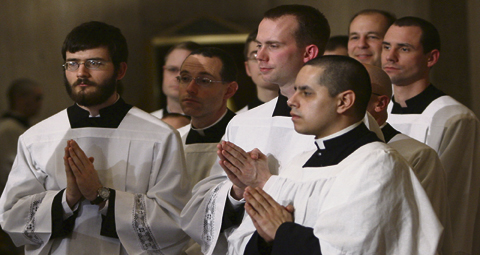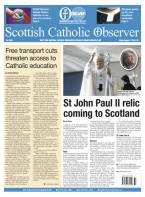July 20 | ![]() 0 COMMENTS
0 COMMENTS ![]() print
print

Caring for a great and noble calling
— With vocations to the priesthood an ongoing concern, we need to look at ways of addressing the issue
By Kevin McKenna
WHEN I agreed to explore a vocation for the priesthood 30-odd years ago with the splendid Sacred Heart Fathers I had more than a few romantic notions of what it all might entail. This was a missionary order and had seen action in some exotic locations around the world.
I had been a devotee of Dennis Wheatley’s black magic adventures in my youth and so I entertained notions of casting out demons in the name of the Lord and having square-gos with Satan. That’s when I wasn’t wading through the Amazon river at the head of a tribe of poor South American jungle-dwellers in a land revolt against some CIA-backed military dictatorship.
The Catholic missionary orders, to me, were the SAS and the Mossad of the Catholic Church; getting involved in the dirty, but necessary, work of the Church on a need-to-know basis.
During this time I imagined those who had chosen to attend Blairs College were seeking a quieter life in a west of Scotland parish where there would also be time to work on their golf handicaps, and attend Celtic Park, as well as look forward to the annual diocesan trip to Lourdes.
I only lasted a year at the Sacred Heart Fathers’ lovely old country seminary in Kilwinning (yes I know). The decision to end my dreams of being enlisted to serve with His Holiness’ Secret Service was arrived at mutually. For my part, the daily 6am Masses and weekend retreats were beginning to play havoc with my social life. The good fathers, on the other hand, were probably pondering how they would explain to their superiors the reasons why someone like me had managed to get through all the security checks.
Nevertheless, I had a great time in Kilwinning. This was mainly due to the enlightened spiritual guidance of two very special priests, each of whom had been entrusted with the task of nurturing a possible vocation in the hearts of a group of scrofulous Glasgow and Lanarkshire teenagers. That no-one from my group made it to the summit of Holy Orders was on no account their fault. Instead I would say that both these men helped to increase my understanding of the Faith in ways that remain with me yet. If I had become a priest then these were the men I wanted to emulate: steadfast in the Faith but with compassion, kindness and great humour. They had a practical Faith and they were slow to judge others.
And so few things depress me more than observing how low priests have fallen in public esteem. Much of this is unavoidable owing to the scandal of priestly sex abuse and the anti-Catholic feeding frenzy that this elicited in some parts of the media and society. The hopeless way that many Catholic authorities dealt with this did not help either—a fact movingly acknowledged by Pope Benedict XVI on his visit to the UK. And as the Church has never encountered such hostility as it does now then I suppose it is to be expected that priests and bishops will be first in the firing line.
My parents’ generation was probably the last that treated priests as though they were Catholic ‘superheroes’ with the power to cure sick babies and calm roaring men. This was a noble calling and Catholic families were enthusiastic in offering up their finest in the service of the Lord. The Faith needed priests to lead and nurture and it was only right that Catholics support the Church’s work in this way.
In time though, we came to see priests for what they were: ordinary blokes with a love of the Church and a desire to serve God and God’s people in whichever way they were called to do so. With each passing year though, their numbers among us diminish and the great parishes they once served are impoverished and imperilled as a result. Now we hear that there are so few priests in Galloway Diocese that soon it may be hard to describe it as a diocese at all.
The bad publicity and the blandishments of this relentlessly material society do not help. As such, could it be that Scottish Catholic families in the 21st century are less enthusiastic about the prospect of a cherished son ‘going away’ in pursuit of something that critics hold to be a lot less prestigious than it used to be? Nor does it help when people like me—and there are far too many of us—fail to offer them any kind of support at all and simply view them as Church civil servants, employed to ensure that we access the necessary Sacraments. These men have sacrificed a normal family life and left behind their own kin to help the rest of us live and breathe our Faith. The very least we can do is ensure in return that they are never lonely and that their own mental or physical burdens need not be borne alone.
The priesthood remains a great and noble calling and one that is at the heart of the Church’s work throughout the world. Quite simply, the Church cannot afford to be shy and coy about our need for many more priests.
Over the last ten years I have helped out at school and university careers and recruitment nights. I find it surprising that the Catholic Church is not represented at these and offering the priesthood as a viable option for teenage boys. And I would like to see a return of the old Caring Church weeks in our Catholic secondary schools.
At events such as these, the school would undergo a mini spiritual renewal and assorted orders of priests as well as diocesan personnel would meet with families and show what they do in the world.
There is though, an immediate problem of personnel that must be addressed if parishes and dioceses are to remain viable. The answer, of course, is staring at us and is immediately within our grasp: a married clergy.
In the next five years, tens of thousands of Catholic men will lose their jobs as the economic recession bites. Many will already be leading spiritual lives and their children will have long flown. They will be held in high esteem within their parishes and their places of work and they will be positive examples of Faith in action.
The Church has already opened its doors to married Anglican clergy. I have yet to hear sound reasons, rooted in either scripture or tradition, why we continue to deny this to our own.
—Kevin McKenna is former deputy editor of the Herald and former executive editor of the Daily Mail in Scotland. He is currently a columnist for the Guardian











